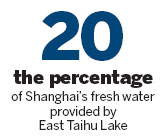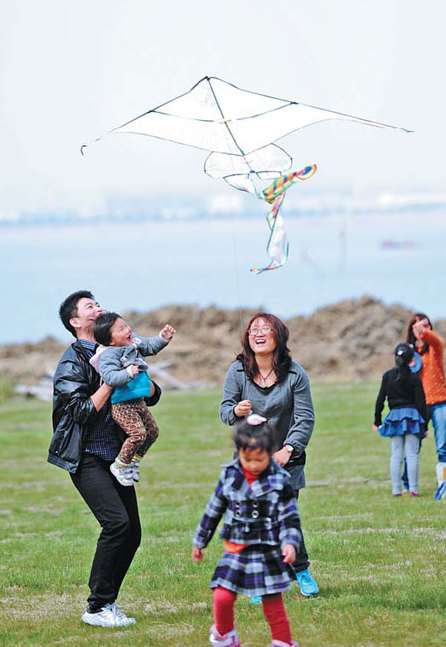Suzhou lake sets new water standards
Updated: 2013-04-02 07:45
By Xu Taotao and Wang Zhenghua in Suzhou, Jiangsu (China Daily)
|
||||||||
|
The ecological park at East Taihu Lake in Suzhou attracts residents on Sunday. The park will have a variety of facilities, including special bicycle paths, when it officially opens on May 1. Pu Jianming / for China Daily |

While most environmental bureau chiefs shied away from public calls to swim in polluted rivers, Suzhou water resources official Zhao Ruilong said he was glad to swim in a lake he has been taking care of for years.
To show their unhappiness with the poor management of some small rivers, a number of entrepreneurs and netizens in East China in recent weeks invited government officials to dive into the water to see for themselves how polluted it has become - offering hundreds of thousands of yuan in cash if the officials accepted the offer.
Most officials gave a lukewarm response, but Zhao, deputy director and senior engineer of the Suzhou water resources bureau, called it "sheer enjoyment" to swim in East Taihu Lake, a 180-square-km arm of Taihu Lake.
"I'm glad to do that," Zhao said. "The quality of the water is even better than a swimming pool."
The official said no one would dare to try two years ago, when the lake's water was highly polluted, largely from overuse of the lake to farm crabs or from land reclamation.
At that time, the waters were almost covered by purse nets used to farm the crustaceans, Zhao said. "It was impossible for a boat unfamiliar with the route to find an exit among these nets."
In a long, narrow shape in the southeast of the Taihu, the lake, called Dongtaihu in Chinese, has been an important water source for Suzhou, a city of 13 million people, and provides 20 percent of the freshwater to the financial center, Shanghai.
For decades, human activities made the lake turn eutrophic - a condition due to an artificial increase in nutrients in the water that causes excessive growth of tiny plants such as algae. The lake's ecological balance was gone, and the water had become murky.
During the worst period, more than 60 percent of its surface was enclosed for crab farming, while nearly 30 percent was reclaimed for growing crops by the residents of Wujiang and Wuzhong districts of Suzhou.
The situation started to improve in 2010, when 4.5 billion yuan ($725 million) was injected to restore the size and ecology by reversing the reclamation, clearing the silt and putting a strict ban on aquatic production.
During the overhaul project, thousands of farmers and fishermen were relocated from lakeside shelters to live and work in other sectors in the city. The once-lucrative but disorderly crab farming business was put under strict controls.
Only a certain amount of crustaceans are allowed to be kept in a limited area of the lake set aside for aquatic production; farmers are banned from throwing in an excessive amount of bait for fear of water contamination.
Thanks to these efforts, the quality of the once-murky and discolored lake was improved. By cutting back on aquatic farming and land reclamation, 896 metric tons of nitrogen and 65 tons of phosphorus, two important parameters of water quality, were reduced every year. The silt-clearing project led to a one-time decrease of organic matter by 60,000 tons.
On a Saturday morning, Ge Bing and his family were taking a break on the lake's bank - a long sightseeing zone featuring a man-made forest, cycle track and landscape bridges. It used to be wetland overgrown with weeds.
Behind the family, a group of cyclists in professional gear raced on the brand new cycle path.
"It's a totally different view," said the 35-year-old Ge, who grew up by the lake. "The lake surface used to be almost blocked from view and it was impossible to get close to the water. Now it presents a refreshing scene, and I will definitely tell more friends to come enjoy it."
But not everything went smoothly during the treatment of the lake. The first obstacle was the billions of yuan needed, which is more than a city government can afford.
To tackle the shortage of funds, the government set up two State-owned companies to take care of financing affairs and, as a reward, the two firms are allowed to develop part of the lakeside area for commercial purposes.
Most of the capital was underwritten by a syndicate of banks. To coordinate the treatment efforts, an office was set up to tackle affairs of the lake treatment that span the two districts of Suzhou.
When the capital was in place, another tough task emerged: How to relocate fishermen and farmers from the lakeside shelters and shift them from the traditional fishing and crab farming business to new jobs.
According to Shen Yuxin, deputy director of East Taihu Lake Comprehensive Development, one of the two companies set up to develop the lakeside area, about 2,500 residents were needed to be cut off from their traditional business in Wujiang alone.
"We met with considerable opposition," Shen said. But a choice must be made between long-term, sustainable development and short-term benefits, he added.
In addition to compensation for direct economic losses, relocated families are allowed to buy new apartments at a discounted rate - about 20 percent of the market price.
A family of two is entitled to a discount apartment of 168 sq m, while a family of three or four gets 238 sq m, and a family of five or more can have 280 sq m.
Farmers are encouraged to find jobs in cities, and they enjoyed the benefits of urban residents guaranteed by the city's insurance system.
Only a small number of fishermen are allowed to continue their traditional crab farming business, with each household allotted 1 hectare of the lake for aquatic production, shrinking from up to 13 hectares before the transformation took place.
The city also overcame legal barriers by reclaiming land from shallows in the northern part of the province, a move to ensure the total area of arable land in the province will not be reduced because of the restoration of the lake area.
"The sole reliance on the efforts of water resources departments and laws for lake treatment doesn't always work," water resources chief Zhao said. "It can only succeed when combining that with an area's economy and a city's future development."
Contact the writers at xutaotao@chinadaily.com.cn and wangzhenghua@chinadaily.com.cn
(China Daily 04/02/2013 page7)

 In Photos: 7.0-magnitude quake hits Sichuan
In Photos: 7.0-magnitude quake hits Sichuan
 Li Na on Time cover, makes influential 100 list
Li Na on Time cover, makes influential 100 list
 FBI releases photos of 2 Boston bombings suspects
FBI releases photos of 2 Boston bombings suspects
 World's wackiest hairstyles
World's wackiest hairstyles
 Sandstorms strike Northwest China
Sandstorms strike Northwest China
 Never-seen photos of Madonna on display
Never-seen photos of Madonna on display
 H7N9 outbreak linked to waterfowl migration
H7N9 outbreak linked to waterfowl migration
 Dozens feared dead in Texas plant blast
Dozens feared dead in Texas plant blast
Most Viewed
Editor's Picks

|

|

|

|

|

|
Today's Top News
Live report: 7.0-magnitude quake hits Sichuan, heavy casualties feared
Boston suspect cornered on boat
Cross-talk artist helps to spread the word
'Green' awareness levels drop in Beijing
Palace Museum spruces up
First couple on Time's list of most influential
H7N9 flu transmission studied
Trading channels 'need to broaden'
US Weekly

|

|








